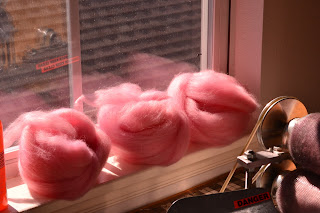
Here they are -- the first actual socks I've made on the sock machine. Before these I made a bunch of plain tubes, about a hundred heels, and several ribbed tubes -- all pulled back and reknit over and over.
My, it's hard to take pictures of your own feet. I did want to show the height of the leg on these socks. They come up to mid calf, which is 100 rows of ribbing. I kind of wish I had gone whole hog and made knee socks, but I wasn't sure about the tension. Tension is the bugbear here -- it's hard to know what tension you're getting while the work is on the machine, because there's between 5 & 10 pounds of weight hanging from the bottom of the sock at all times which as you might guess affects stitch size. So you knit, take your tube off the machine & let it relax, then measure & assess & so forth. Really you should wash it, because that's when it
really reveals its true nature. But I'm still at such a basic level that I'm skipping those niceties.
So these are okay socks -- acceptable but not fabulous. The tension in the feet is looser than I like, about 7.5 stitches per inch when I would really rather have 8.5 or even 9. I don't think I can get this particular cylinder to knit tighter, so I'm going to throw the socks in the dryer and see if they'll shrink up just a bit.
Also they slouch down a little, which is just what you'd expect for a ribbing that hits at mid-calf. I do wish I'd had the courage of my convictions and had made them with about 150 rows of ribbing. Doing the same thing for another 50 rows is no big deal -- it's changing from one thing to another (say, ribbing to stockinette) that takes time.
Clearly I'm going to buy my sock yarns in batches of 150 g, not 100 g. This is yarn that came along with the machine, and I had 4 skeins (this used two). I suppose I could cut off the leg at the ankle and knit up from there ... or just wear them and move on to the next. Because if I started fiddling with these, I'd have to make the stripe pattern match, and I just don't want to do that.
One CSM knitter said she tends to knit socks in groups of three -- she knits one, figures out what she should have done differently, knits the second that way, then rips out the first and reknits it to match. Others find a favorite yarn or two and work with them over and over again, because they are so predictable.
The surprise with my machine was discovering that the cylinder - ribber combination was not a standard one. Usually your ribber has half as many needle slots as the cylinder, so you can half half the stitches knitting on the cylinder and half purling on the ribber. You can do other combinations as well, such as 2x2 or 1x3 (or 4 or 5), but the 2:1 ratio is pretty standard.
But my machine came with a 60 needle cylinder and a 40 slot ribber. It also came with notes from the previous two owners showing that these are what the (nameless) restorer supplied in the first place. I wonder why? I was fortunate to be able to locate a 30 slot ribber dial for this brand of machine and it is on the way to my house. It's coming from New Zealand, though, so I don't know how long that will take.
Then a couple of days ago I found an 80 slot cylinder on ebay. This would match up with my 40 slot ribber, so I was quite interested. The seller was clearly parting out a machine and had four different cylinders for sale -- it was surprising to see the variation in the selling price between the four. I think I was very lucky since I won the auction for $26 + $24 shipping -- that seems exorbitant but it's coming from Canada. At any rate, $50 seems like a good price for a cylinder; a newly manufactured one that will fit this machine is $235. (Have you noted all the conditional words I'm using -- "I think" "seems like a good price" etc.? I won't
really know if this is a good deal until it arrives and I can assess its condition. But $50 seems like a reasonable gamble to me.)
My current project on the machine is a pair of legwarmers for Charlotte to wear over her ballet tights. I am using a sport weight craft store acrylic and I guess am following the 3-for-a-pair model -- I made one to figure out how long to make it and where to set the tension, and have made the second which I think is a keeper. I hope to do the third today, but not if I don't get off the computer!









